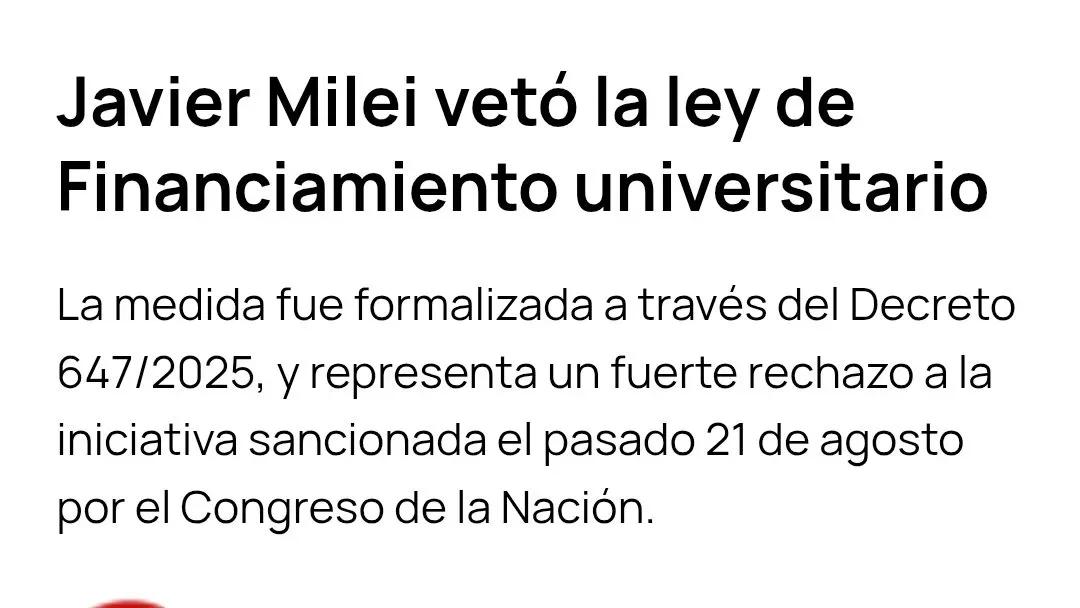The impact of the veto on the university financing law in Argentina
The recent veto by President Javier Milei of the University Financing Law has sparked intense debate in the Argentine educational and political sphere. This regulation, which aimed to update the operating expenses of universities for inflation, was deemed by many as an essential mechanism to ensure the financial sustainability of educational institutions. However, the government argues that the law does not align with its austerity and public spending reduction policies. This article analyzes the implications of this decision in the current context.
📉 Current landscape
The University Financing Law, which sought to adjust the resources allocated to universities in light of inflation, represented an attempt to stabilize the educational budget in a country where the economic crisis has led to severe cuts in various areas. With inflation exceeding 100% annually in recent years, universities have faced increasing difficulties in maintaining their operations. The veto, therefore, not only prevents the updating of resources but also adds pressure to an educational system already in a critical situation.
The opposition's reaction was immediate, indicating that the veto could result in a significant decline in educational quality and an increase in inequality in access to higher education. This context leads us to wonder: what future awaits university education in Argentina if effective measures are not taken to adequately finance it?
🌍 International comparison
When observing other countries, various strategies can be identified for addressing university financing. For example, in Germany, public universities are largely funded by the state, allowing for free education and equitable access to higher education. This model has proven effective in promoting inclusive education and training highly qualified professionals.
In contrast, the United States presents a system where funding heavily relies on high tuition fees and a combination of student loans. This has led to a significant increase in student debt, which has surpassed $1.7 trillion. The lack of a solid financing system has sparked debates about the sustainability of the educational model and its accessibility.
These examples invite reflection on the importance of establishing a financing model that not only guarantees the sustainability of universities but also promotes equity in access to education.
⚖️ Social, political, and economic implications
The veto of the University Financing Law has profound implications for Argentine society. From a social perspective, the lack of resources could lead to a deterioration in education quality, which in turn will affect the training of future professionals. This could result in a diminished competitive capacity for the country on an international level, exacerbating the brain drain, a phenomenon that has already affected Argentina in recent years.
From a political standpoint, the veto may be interpreted as an attempt by the government to consolidate its austerity agenda, generating even deeper divisions between the administration and opposition forces. The lack of consensus on educational issues may also provoke student movements and protests, as has occurred in the past in response to similar measures.
Economically, the reduction in funding could lead to increased costs for students, which might limit access to higher education for the less privileged classes. This, in turn, could perpetuate cycles of poverty and inequality that are hard to break.
🔍 Final reflections
The veto on the University Financing Law is not an isolated event, but rather reflects a broader context of tensions in the Argentine educational and political landscape. Higher education is a fundamental pillar for the development of any nation, and its financing must be considered a strategic priority.
Argentina faces a dilemma: how to balance the need for austerity with the pressing need to invest in education? Without a clear and sustainable approach, the country may compromise not only its educational future but also its social and economic development in the long term.
The challenge is monumental, and it is necessary to open an inclusive dialogue that takes into account all voices involved in the educational system. The lack of a clear direction could lead to more temporary patches instead of sustainable and effective solutions. Education cannot be seen as an expense, but as a fundamental investment in the country’s future. The way forward must be charted with responsibility and commitment.

Comments